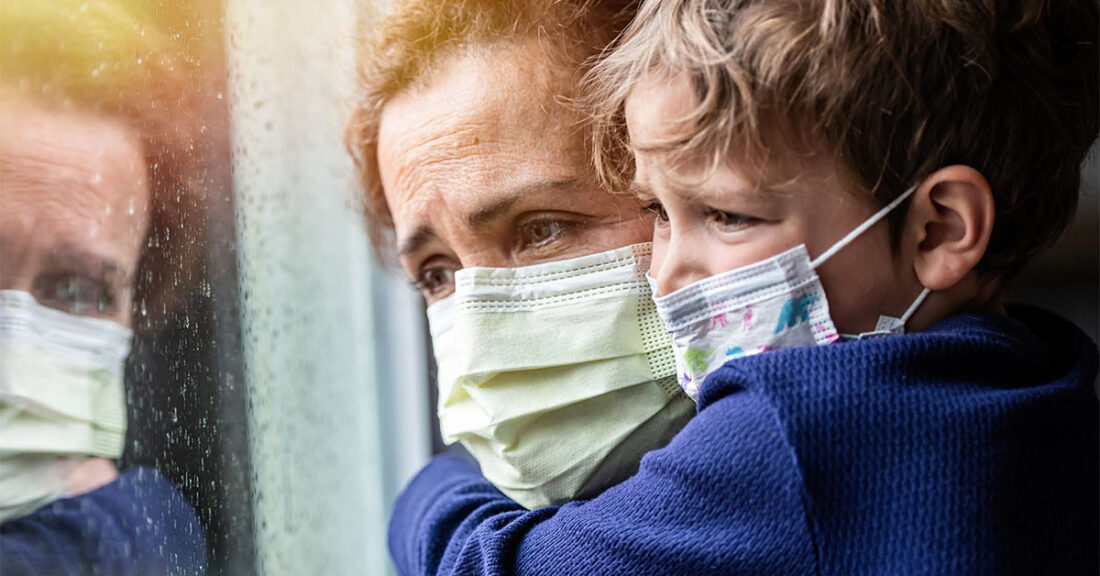New Report Finds Many Families with Children Are Depressed, Uninsured, Hungry and at Risk of Foreclosure or Eviction

Families require an immediate policy response to meet the needs of children during the COVID-19 pandemic, which has left millions struggling with finances, school, work and mental health, according to a new policy report from the Annie E. Casey Foundation, a decades-long advocate for young people in America. In Kids, Families and COVID-19: Pandemic Pain Points and the Urgent Need to Respond, a 50-state report, data show children and families are suffering from the unprecedented disruption and economic storm set off by the global health crisis.
Download Kids, Families and COVID-19
In assessing food security, the ability to make rent or mortgage payments, health insurance status and mental health concerns, the Foundation identified four pain points for children and families that require immediate action for relief and an opportunity to build a more equitable future. Key findings include:
- One in seven families with children (14%) said that in the most recent week, there was sometimes or always not enough to eat in their household. The figures were 23% for Black households with children, 23% for those of two or more races or another race and 19% for Latinos compared to white (10%) and Asian households.
- Nearly one in five households with kids (18%) said they had only slight confidence or no confidence at all that they would be able to make their next rent or mortgage payment on time.
- One in eight families with children (12%) lack health insurance, a figure which has been worsening over the past four years. More than a third of people with children in the household (34%) reported that they had delayed getting medical care in the previous month.
- A fifth of respondents with children in their households (21%) reported that they had felt down, depressed or hopeless in the previous week, indicating a widespread need for access to mental health care.
“America’s children are in crisis,” said Annie E. Casey Foundation President and CEO Lisa Hamilton. “All across the country, families with children are struggling to overcome an unprecedented convergence of emergencies. We need immediate and decisive action from policymakers that prioritizes equitable solutions to help families survive this catastrophe.”
National data indicate that trying to educate children remotely while parents need to work is taking an enormous toll on families. Nearly half of the adult respondents (49%) indicated that they felt they were not equipped to help their children with schoolwork, and 32% reported lacking adequate broadband internet and online learning tools. More than three in ten respondents with children said they are less likely to return to work due to the lack of child care (32%).
Maine, Minnesota, Nebraska and New Hampshire appeared among the top ten states for three or all four of the pain points identified in the report. States in the bottom ten for in three or all four categories were Florida, Louisiana, Mississippi, Nevada, Rhode Island and Texas.
“Our federal, state and local decision makers need to mount a response to COVID-19 that enables America’s children and families to weather this crisis and yields more equitable outcomes,” said Leslie Boissiere, vice president of External Affairs at the Casey Foundation. “The Coronavirus Aid, Relief and Economic Security (CARES) Act, which earlier this year provided an unprecedented $1.8 trillion in support to families, businesses and state, local and tribal governments, is proof our leaders can intervene to reach families and children in pain.”
The Foundation urges policymakers and child advocates to unite across differences and put COVID-19 response at the top of 2021 agendas to make sure children have what they need to survive and thrive, calling on elected officials and other decision makers to:
- Put racial and ethnic equity first in policymaking by using disaggregated data and engaging community stakeholders, ensuring the policymaking process is informed by the diverse perspectives of those hardest hit by the crisis and created in partnership with communities. This approach should underpin any concrete policy actions.
- Prioritize the physical and mental health of all children by guaranteeing that any vaccine will be available without cost as a factor and by strengthening the Affordable Care Act. To promote mental health, particularly in times of crisis, policymakers should work to reduce the student-to-school-counselor ratio in all school settings to levels recommended by mental health professionals.
- Help families with children achieve financial stability and bolster their well-being by expanding access to unemployment insurance for part-time and gig economy workers, low-wage workers and students and by expanding child care access. Beyond any temporary housing assistance programs aimed at heading off a foreclosure or eviction crisis, federal policymakers should expand housing programs most frequently accessed by families with children. They should also eliminate barriers to accessing Temporary Assistance for Needy Families (TANF), the Earned Income Tax Credit (EITC) and the Child Tax Credit (CTC).
- Ensure schools are better funded, more equitably funded and ready to meet the needs of students disparately affected by the pandemic. By protecting school funding from the economic effects of the pandemic, building maintenance-of-equity requirements into relief packages and investing to address disparities in technology access at home and in the classroom.
“Every child in the United States should have the basics, and families should have support to survive the considerable stress and pain of these times,” added Hamilton. “Our leaders can respond to the COVID-19 crisis by putting equity first, prioritizing children’s physical and mental health, helping families achieve financial stability and strengthening schools so kids can thrive in spite of the extraordinary times.”






